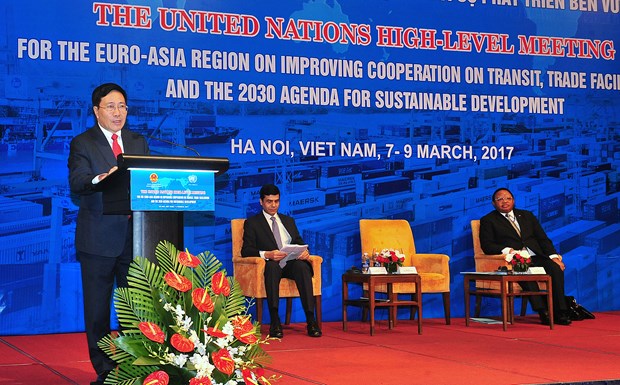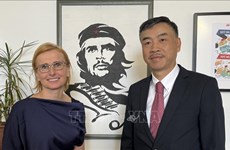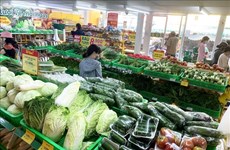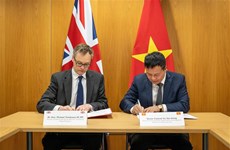Vietnam commits to 2030 Agenda for sustainable development
Deputy Prime Minister and Foreign Minister Pham Binh Minh has highlighted Vietnam’s commitments to the 2030 Agenda for Sustainable Development at a UN meeting in Hanoi on March 7.
 Deputy Prime Minister and Foreign Minister Pham Binh Minh speaks at the meeting (Photo: VNA)
Deputy Prime Minister and Foreign Minister Pham Binh Minh speaks at the meeting (Photo: VNA)Hanoi (VNA) – Deputy Prime Minister and Foreign Minister Pham Binh Minh has highlighted Vietnam’s commitments to the 2030 Agenda for Sustainable Development as well as the country’s support for cooperation partners at a UN meeting in Hanoi on March 7.
At the high-level meeting for the Euro-Asia region on improving cooperation on transit, trade facilitation and the 2030 agenda for sustainable development, Minh said Vietnam believes that strengthening international collaboration with the engagement of various parties is crucial to help countries, including transit and landlocked nations, to overcome challenges and achieve sustainable development goals.
The partnership and cooperation based on mutual respect and benefit among landlocked developing countries and transit nations is the way to secure prosperity in the future, he said.
The Deputy PM noted that after 30 years of reform, Vietnam has acknowledged the importance of trade and investment to economic growth and poverty reduction. Vietnam is now a member of the World Trade Organisation, the Association of Southeast Asian Nations (ASEAN), the Asia-Pacific Economic Cooperation (APEC) Forum and many free trade agreements, which helps the country get better access to markets in the world and boost its socio-economic development.
He said Vietnam always attaches much importance to fostering relations, including economic connectivity, with its neighbouring countries, adding that their success and prosperity will create positive impacts on Vietnam’s growth and ensure sustainability for the whole region.
The Deputy PM also noted that Vietnam has conducted different measures to foster economic and infrastructure connectivity with its neighbouring countries, especially with Laos, a landlocked developing nation, both bilaterally and regionally.
Meanwhile, the country is working closely with Mekong River downstream countries to expand an economic corridor and connect remote areas with international seaports, he said.
Minh took this occasion to thank the UN for its support to Vietnam in gaining socio-economic achievements, adding that Vietnam has contributed remarkably to the UN’s work over the past 40 years and pledged to work harder in the field.
At the event, Gyan Chandra Acharya, UN Under-Secretary-General and High Representative for the Least Developed Countries, Landlocked Developing Countries and Small Island Developing States (UN-OHRLLS), stressed that there should be the engagement of many countries, ODA implementation tools, and mobilization of domestic investment, technology and capacity building to realise the 2030 Agenda for sustainable development,
He asserted that trade plays an important role and acts as a tool in the implementation of the agenda, which is seen as a motivation of economic growth and poverty reduction.
Meanwhile, Frederick Musiiwa Makamure Shava, President of the UN Economic and Social Council (ECOSOC), underscored the importance of strengthening trade facilitation programmes and building a legal framework on transit. He also highlighted the need to share experience and effective policies and initiatives in sustainable development.
Hongbu Wu, UN Under-Secretary-General for Economic and Social Affairs, stated that sustainable transportation is the key to sustainable growth and economic integration while ensuring environmental protection.
Mukhisa Kituyi, Secretary-General of the UN Conference on Trade and Development (UNCTAD), said that landlocked countries are dependent on exports with low added value due to high costs and trade losses resulted from their poor access to sea transportation.
He suggested that the landlocked and transit countries should foster cooperation with priority placed on creating chances for international transportation access.
Umberto de Pretto, Secretary-General of the International Road Transport Union, held that it is necessary to turn landlocked countries into road-linked nations through road networks connecting remote villages to international markets.
Jointly held by the Ministry of Foreign Affairs and the UN-OHRLLS, the meeting has six discussions on a range of issues on transit, trade facilitation and implementation the 2030 Agenda.
Participants are also expected to seek measures to promote cooperation in customs among landlocked and transit nations, and creating favourable conditions for trade and investment as well as construction of trans-national transit systems and attract more investment in building necessary bilateral and multilateral legal frameworks in the field.-VNA













